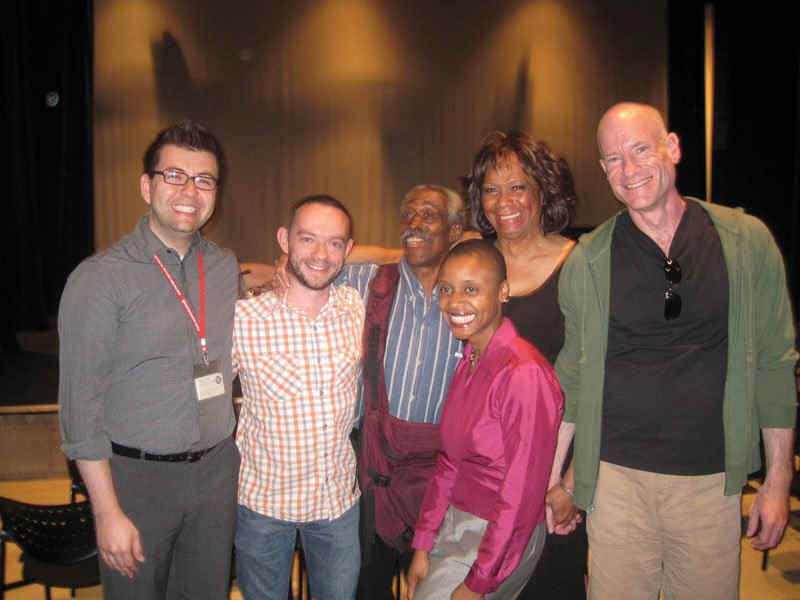|
AIDS: Sex and Seniors in the City, Forum and Film on HIV/AIDS and Older
Gays
By Kate
Sosin, Windy City Times
June 6,
2011

Pictured, from left: Director Gregory
Gross: Dennis Belogorsky, Frank Parker, Helena Bushong, and Walter
Maul. In Front: Hope Barrett. Photo by Kate Sosinope Barrett. Photo by
Kate Sosin
A room
of more than 75 people broke into cheers when Hope Barrett, Center on
Halsted senior director of public programs, said people don't stop
having sex at age 30.
"We know that people are still having sex at 50, at 60, at 70," Barrett
said over loud applause during a meeting at the Center on Halsted's
Hoover-Leppen Theater.
That fact may seem obvious to many. However, if one couples the stigma
surrounding sex and elders with a persistent stigma around HIV/AIDS,
there is a trend that is putting more people over 50 at the highest
risk of HIV infection ever.
That trend is the subject of a powerful new documentary produced by
Center on Halsted. Aging POZitively: The story of three older adults
living with HIV, directed by Dennis Belogorsky, follows the lives of
three older adults coping with a virus they contracted late in life.
The 34-minute film premiered May 23 to much fanfare and many tears.
"It was very difficult to find folks to come put a face to this,"
Barrett told the audience before the film started. Barrett told Windy
City Times that older adults shied from talking publicly about their
HIV status.
Barrett finally found
willing candidates in Helena Bushong, Frank Parker and Walter Maul.
They each offered an unprecedented telling of the ways HIV affects
older adults not just medically but personally.
Helena Bushong was 47 when she found out she was HIV-positive. "At the
time, I was in an environment where I felt I couldn't reveal my health
status," Bushong said in the film. Bushong left for Chicago to stay
with friends who wanted to care for her.
"I moved here [ to the Beverly neighborhood and ] pretty much resolved
to die," she said.
That was 13 years ago. Today, Bushong is active in AIDS prevention
advocacy and transgender organizing. However, life is hardly simple for
Bushong. She can't always go see theater on the North Side, one of her
favorite things, because doing so would interrupt her HIV regimen. She
struggles with deciding when and how to tell people she meets that she
is HIV-positive.
U.S. Centers for Disease Control and Prevention statistics suggested
that, in 2005, people over age 50 made up 35 percent of AIDS deaths and
15 percent of new HIV infections.
Aging POZitively aims to bring those numbers out in the open through
personal interviews and expert commentary. Featured in the film are
Center on Halsted's Jill Dispenza and Gregory Gross; Magda Houlberg,
M.D. from Howard Brown Health Center; and Nathan Linsk, Ph.D., from the
University of Illinois at Chicago.
According to experts, healthcare providers tend to shy away from
talking to older adults about HIV/AIDS because many feel uncomfortable
with the idea that older people have sex. New drugs like Viagra,
however, have made it possible for many older adults to have sex later
in life.
Some older adults may mistake HIV symptoms like fatigue for signs of
aging, but stigma prevents many people from getting tested, discussing
HIV with sexual partners, and finally, talking about HIV if they are
positive.
"I don't know another word other than 'shame,' maybe, that you've
fallen to this level," said Parker on screen, of the progression of his
HIV and his nagging shortness of breath.
Maul also struggles with HIV and aging. The 50-year-old former interior
designer is often forced to recuperate for an entire day if the
previous day was busy for him. Maul has moved past feeling embarrassed
that he has HIV, however. Like Bushong, he puts much of his energy into
HIV-prevention efforts.
Audience members at the screening lauded the courage of Bushong, Parker
and Maul in sharing their stories. The three sat together in the
audience, holding hands. When the lights came up, many in the crowd
stood up and "came out" as being HIV-positive. Others cried quietly.
Bushong said unless older adults start talking about HIV, AIDS advocacy
work will continue to target youth. "The whole idea about being
transparent and open about HIV is really important," she said. "Once we
address those secrets, we're set free."
A portion of the $475,000 grant awarded last year by U.S. Health and
Human Services to Center on Halsted for senior services funded Aging
POZitively. The film will be available for free viewing at http://
www.centeronhalsted.org .
More
Information on World Health Issues
Copyright © Global Action on Aging
Terms of Use
|
Privacy Policy
|
Contact Us
|



